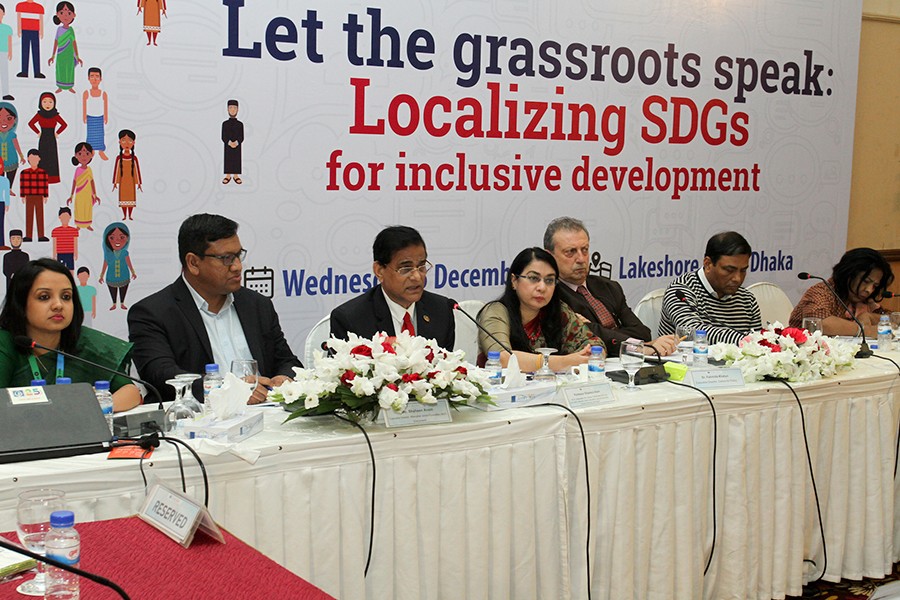Stakeholders' coordination key to achieving SDGs
Experts also focus on decentralisation

Published :
Updated :

Speakers at a programme said effective coordination among the government departments and other stakeholders is the key to achieve the Sustainable Development Goals (SDGs) properly and in time.
They also emphasised empowering the local government institutions through decentralisation and providing them with required resources to get better output from the SDG initiatives.
They also called for setting up SDG priorities and focusing on underdeveloped regions of the country for inclusive development.
The suggestions came at a dialogue titled 'Let the Grassroots Speak: Localising SDGs for Inclusive Development'.
Centre for Policy Dialogue (CPD) and Oxfam Bangladesh jointly organised it at a hotel in the city's Gulshan-2 area.
Planning Commission (PC) Member (General Economics Division) Professor Shamsul Alam addressed the programme as the chief guest.
Head of Cooperation to European Union (EU) Delegation in Dhaka Mario Ronconi, Manusher Jonno Foundation (MJF) Executive Director (ED) Shaheen Anam, and Oxfam Bangladesh Country Director Dipankar Datta also spoke on the occasion.
CPD Executive Director Dr Fahmida Khatun moderated the dialogue, where CPD Senior Research Fellow Towfiqul Islam Khan presented findings of a study titled 'Localisation of SDGs in Bangladesh: Reflections from a Set of Lagging Regions'.
Mr Khan said the Millennium Development Goals (MDGs), implemented in 2015, were taken as a top-down approach that failed to capture the notion of inclusive growth.
Learning from that experience, SDGs were framed as a bottom-up strategy that requires localisation of the idea through inclusive participation.
To mitigate the challenges to meet SDGs in the country, the local governments should be duly empowered and provided with sufficient resources.
He further said it is also important that the local governments and authorities concerned are well aware of the global and national development strategies, and can link them with local priorities.
The CPD senior research fellow focused on setting up priorities in terms of the country's socio-economic context, geographic and climatic nature, cultural diversity, and level of political determination.
Besides, successful localisation of SDGs in the country will be difficult without a strong decentralised local government system, he added.
Speaking at the programme, Shamsul Alam said the role of local government departments is very important for implementing SDGs, but they are not that powerful yet to execute such initiatives.
Identifying (lack of) coordination among the government departments a problem, he said, "Bangladesh is a small country but we have 54 ministries, while a large country like the United States has only 13 (actual number is 15) ministries (executive departments)."
It is somewhat tough to coordinate a large number of stakeholders, as around 27 ministries directly work in the areas of SDGs, he added.
The PC member said localisation of SDGs is important, and there is a lack of awareness about it among the local government officials.
"We are still talking too much about it (implementation of SDGs) instead of working," he opined. Shaheen Anam said special focus should be given on coastal, haor and riverine regions, as these are lagging behind in implementing SDGs.
Terming (lack of) coordination among stakeholders the key bottleneck for development initiatives in the country, she said (ensuring) accountability, transparency and governance in all levels of the government is required to achieve SDGs.
The MJF ED also suggested taking market-driven strategies for skill development and job creation.
Focusing on unawareness about SDGs, Fahmida Khatun said a large number of the country's people, including many government officials, still do not have a clear conception about different aspects of SDGs.
So all the stakeholders should be connected through a framework in the SDG implementation process for successfully achieving these, she added.
The dialogue was arranged as part of a project titled 'Enhancing the participation of community-based organisations (CBOs) and civil society organisations (CSOs) in democratic governance in Bangladesh'. The EU-funded project is under implementation by CPD and Oxfam.
Representatives from different development partners, think-tanks and NGOs also spoke on the occasion.


 For all latest news, follow The Financial Express Google News channel.
For all latest news, follow The Financial Express Google News channel.